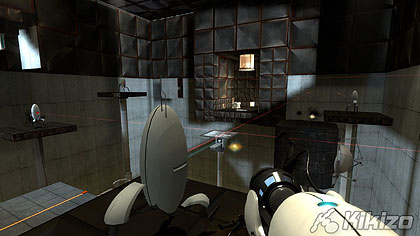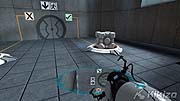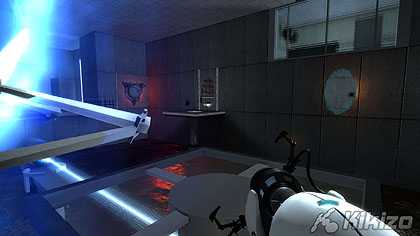The Orange Box
It's the most obvious 10/10 release all year.
| Version Xbox 360, PS3, PC | Developer Valve | Publisher Valve / EA | Genre FPS |
||||
Page 2
After a while, Episode Two opens up into much more expansive environments - the final level is absolutely rammed with Striders and Hunters that work in packs to try and destroy you (and your base, and humankind) and a great example of an epic battle in an open space in the Half-Life 2 way. This level makes use of a new car that you drive around in through a few parts of the game, which takes a couple of minutes getting used to but feels very natural to control after that.
Episode Two is slightly longer than Ep1, but both feel about the right length. Episode Two is slightly better on the whole but both are fantastic additions to the series. If you already played Episode One, you're in for a treat with Two, which really opens things up for some classic HL2 action. The learning curve and challenge (which you can change the difficulty of) is spot on, and the ending of Episode 2 is really quite stunning. I think that playing through Episodes One and Two back-to-back was not only brilliant, but combined it is almost the same length as Half-Life 2, and probably a little bit better as well. I can't give enough praise to the Half-Life 2 games, so let's move on to Orange Box's other two additions.
The first is called Portal. If you haven't heard of it, it's a game in which the player has a portal device (held like a weapon) that opens up portals linking two completely different spaces together. This game, in first-person perspective, it a 3D puzzle solving fest, and it's the most original, engrossing thing I've played in ages.
My favourite thing about some of the very best FPS games of the 90s, like Quake, Duke Nukem, and in particular, the criminally overlooked masterpiece that is Powerslave (known as Exhumed in Europe) was the way that they started to introduce truly 3D puzzle solving in environments that were perfectly suited. You didn't always need to master it to get through the game, but to truly explore it and collect all of the hidden items, you had to use your imagination and properly think in three dimensions.
Portal is so good because it focuses exclusively on the puzzle element that makes games like Exhumed (and these days, Half-Life 2 on a much bigger scale) so rich. Explaining why it works so well is tough. A friend was over earlier in the week and I had a go at explaining it to him. Mmm, can you put Forza on instead, he grunted. I refused, and then showed him Portal (I was on the final level at the time, when things had started to get insane) and it clicked pretty much straight away. Seeing is understanding, and to play it is to be instantly hooked.
Once you get into the swing of Portal, you feel like an absolute genius for solving these tricky problems - genius second only to the designers who came up with this concept and the many different levels that fully exploit it and force you to think. The best example is probably the momentum jump. You start somewhere up high and make a portal (to come out of after the next step). You then jump down and look at the floor and shoot open a second portal on your way down, and as you go through it you appear from the first one, but with the continuous momentum you just built up from your fall towards the ground. This shoots you out of the first portal at speed, and hopefully you land somewhere you were trying to reach.
Sometimes you need to do this twice to build up even more momentum to reach your target. Sometimes you have to do it under the pressure of time because they've designed in a three-second closing gate that you need to get something through in time. Sometimes you have momentum coming out of both portals and bounce up and down until you shoot open another one on a distant platform you need to reach where it's all about timing and precision. It is a lot of fun and, in general, solving the levels that Portal presents to you is possibly the most rewarding gameplay anyone has come up with in recent years.
There are many other examples of 'wow, that's great design' in Portal. Many of them center around ways in which you get things to happen by manipulating space with the portals. Need to get inside a glass tube that leads somewhere but no way of smashing it open? Simple. Just open up a portal in front of it, then go back to a room that had a automatic turret firing when it detects motion, open another portal in front of that, and get it to shoot you. Then move out the way and watch its bullets go right through the portal and smash the glass. Haha! Stupid turret. I rule, because I tricked you. There are plenty of examples of fantastic game design like this, and the final boss (make that the only boss) in the game is also along these lines and frankly excellent.













 Satoru Iwata Video Interview - the late Nintendo president spoke with Kikizo in 2004 as 'Nintendo Revolution' loomed.
Satoru Iwata Video Interview - the late Nintendo president spoke with Kikizo in 2004 as 'Nintendo Revolution' loomed. Kaz Hirai Video Interview - the first of Kikizo's interviews with the man who went on to become global head of Sony.
Kaz Hirai Video Interview - the first of Kikizo's interviews with the man who went on to become global head of Sony. Ed Fries Video Interview - one of Xbox's founders discusses an epic journey from Excel to Xbox.
Ed Fries Video Interview - one of Xbox's founders discusses an epic journey from Excel to Xbox. Yu Suzuki, the Kikizo Interview - we spend time with one of gaming's most revered creators.
Yu Suzuki, the Kikizo Interview - we spend time with one of gaming's most revered creators. Tetris - The Making of an Icon: Alexey Pajitnov and Henk Rogers reveal the fascinating story behind Tetris
Tetris - The Making of an Icon: Alexey Pajitnov and Henk Rogers reveal the fascinating story behind Tetris Rare founders, Chris and Tim Stamper - their only interview? Genuinely 'rare' sit down with founders of the legendary studio.
Rare founders, Chris and Tim Stamper - their only interview? Genuinely 'rare' sit down with founders of the legendary studio. The History of First-Person Shooters - a retrospective, from Maze War to Modern Warfare
The History of First-Person Shooters - a retrospective, from Maze War to Modern Warfare